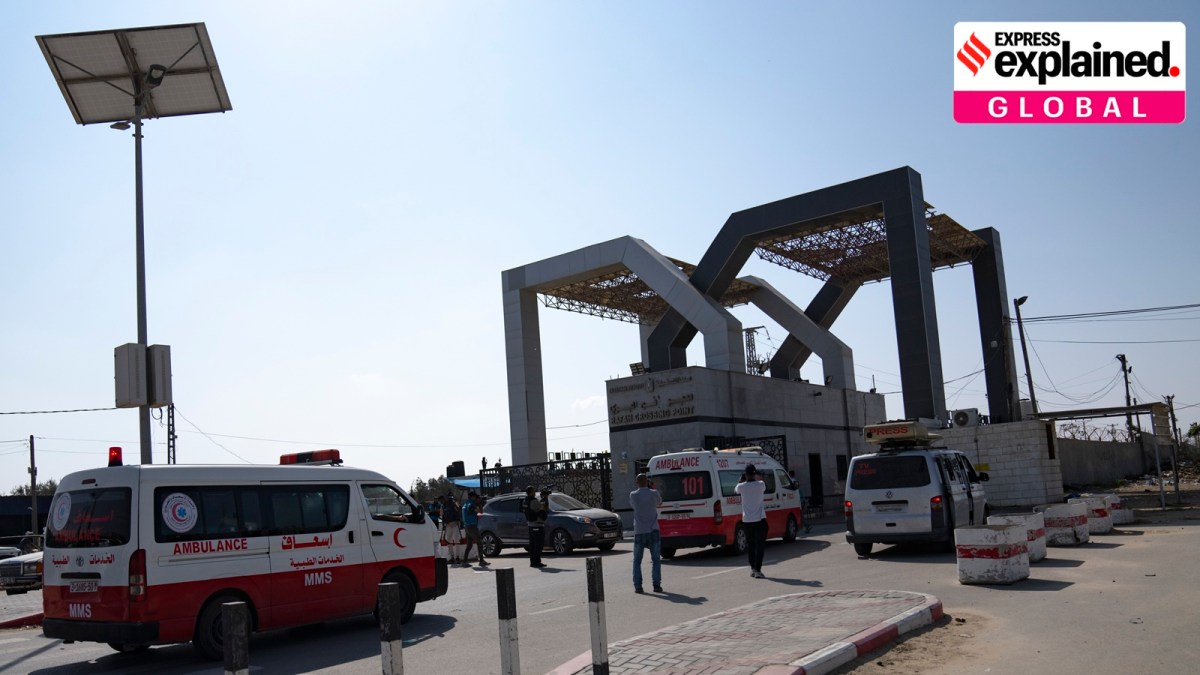Rafah border crossing between Gaza and Egypt partially opens: What is the crossing and why is it significant?
After three weeks of diplomatic negotiations, a Qatar-mediated deal among Egypt, Israel, and Hamas was reached that allowed the partial opening of the Rafah border crossing.

The Rafah border crossing between the Gaza Strip and Egypt has opened for the first time since the Israel-Hamas war broke out in early October. On Wednesday (November 1), at least seven injured people from Gaza entered Egypt in ambulances for treatment.
The crossing is the main entrance and exit point to the tiny Palestinian enclave from Egypt. It is controlled by Egypt and has been the focus of heated international negotiations as the only entry point for relief supplies — Israel imposed a “total siege” on Gaza following the attacks carried out by Hamas.
What is the Rafah border crossing?
It’s the southernmost post of exit from Gaza and borders Egypt’s Sinai peninsula.
There are only two other border crossings from and into the Gaza Strip. One is, “Erez, a crossing into Israel in northern Gaza, which is for people,” and the other is “Kerem Shalom, a solely commercial goods junction with Israel in southern Gaza,” according to a report by the BBC. Both of these crossings are shut.
What is the current situation at the crossing?
After three weeks of diplomatic negotiations, a Qatar-mediated deal among Egypt, Israel, and Hamas was reached that allowed the partial opening of the Rafah border crossing. Under the agreement, Egypt will allow the entry of 88 critically injured Palestinians and around 500 foreign nationals, according to the BBC.
Israel and Egypt have agreed upon a list of people with foreign passports who can leave Gaza, an official told Reuters. Another official confirmed that Israel was coordinating the exits with Egypt.
Reuters reported that all the evacuees weren’t expected to make it out on Wednesday — around 200 people were waiting at the Palestinian side of the border on Wednesday morning. It isn’t clear for how long the crossing will remain open for evacuation.
Why is the Rafah border crossing important in the conflict?
In response to the cross-border infiltration by Hamas fighters on October 7 that killed more than 1,400 Israelis, Israel imposed a total blockade of Gaza. The Jewish state shut down Erez and Kerem Shalom until further notice, leaving the Rafah border as the only way into and out of the Strip for people seeking to flee. It is also the only crossing point for humanitarian aid.
More than 8,700 Palestinians have been killed, according to health authorities in the Hamas-run Gaza Strip, since October 7.
Why is access across Rafah restricted by Egypt?
Egypt is wary of insecurity near the border with Gaza in northeastern Sinai, where it faced an Islamist insurgency that peaked after 2013 and has now largely been suppressed.
Since Hamas took control in Gaza in 2007, Egypt has helped enforce a blockade of the enclave and heavily restricted the flow of people and goods.
In 2008, tens of thousands of Palestinians crossed into Sinai after Hamas blasted holes in border fortifications, prompting Egypt to build a stone and cement wall.
Egypt has acted as a mediator between Israel and Palestinian factions during past conflicts. But in those situations it has also locked down the border, allowing aid to enter and medical evacuees to leave but preventing any large-scale movement of people.
Why are Arab states so reluctant to take in Palestinians?
Arab countries have deep-rooted fears that Israel’s latest war with Hamas in Gaza could spark a new wave of permanent displacements.
Egypt, the only Arab state to share a border with Gaza, and Jordan, which flanks the Israeli-occupied West Bank, have both warned against Palestinians being forced off their land.
For Palestinians, the idea of leaving or being driven out of territory where they want to forge a state carries echoes of the “Nakba”, or “catastrophe”, when many fled or were forced from their homes during the 1948 war that accompanied Israel’s creation.
Israel contests the assertion it drove Palestinians out, saying it was attacked by five Arab states after its creation.
(With input from Reuters)